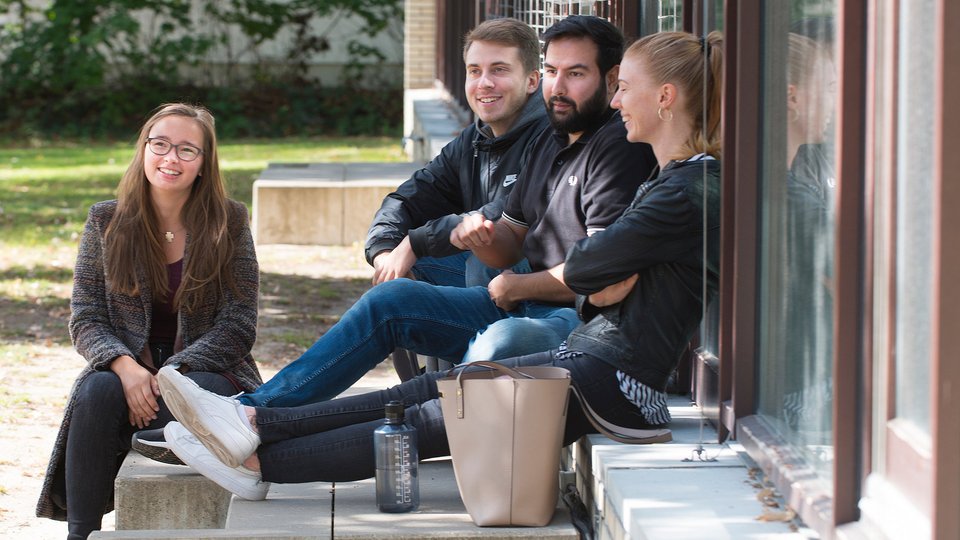Study program
The Master's program is a consecutive degree program that builds on a Bachelor's degree in Protestant religious education or comparable qualifications. It expands the educational level acquired in the Bachelor's program to include further fields of activity (e.g. in the area of adult education and team coaching) and deepens the graduates' competences in the fields of educational work, didactics, theology and cybernetics (church leadership). Thus, a profile has been developed for this degree program that responds to the specific professional requirements within schools and congregations.
Advantages, perspectives, focal points
The Master's program opens up a variety of opportunities within the church job market. In particular, it qualifies students to:
- Teach religious education in schools
- Assume leadership positions and take on management tasks at a district church level
- Be accepted into ordained pastoral ministries (after a second, practical training phase/vicariate).
General information on the program
The Master's program imparts pedagogical, theological and didactic skills that are needed to organise congregational work within churches and to teach religious education in schools. In both fields of study, students are prepared for a critical examination of religious traditions as well as dealing with questions of Christian theology and ethics. Special emphasis is placed on the training of personality-related competences as well as the training of conversation skills, counselling and pastoral care. The study content includes, amongst others, the following areas:
- Education for all ages, especially adult education
- Counselling and leadership within the church and in the community
- Challenges being faced by modern religious cultures.
Contents and processes
There is a great need for qualified professionals in the areas of religious education in schools and for the educational work of the church. The professional interpretation, didactic mediation and liturgical-practical staging of one’s religion under current social conditions demands a high degree of pedagogical, psychological and theological competence. The Master's program enables students to hermeneutically decode the signatures of modern religious cultures and to translate the symbols of the Christian faith into current life situations.
Program structure
The three semesters of study consist of four module groups with the following focal points:
1st semester
Scientific-theoretical and practical basics (A modules), deepening of communicative, psychological and pedagogical professionalism (B modules)
2nd semester
Reflection on the professional fields of school and community (C modules)
3rd semester
Research methods, Master's lecture courses and Master's thesis (D modules)
Acquisition of competences
The three-semester Master's program is designed as a full-time program. It starts annually in the summer semester. The Master's program has a special focus on the following contents:
- Pedagogical work with people of all ages (with a focus on adult education).
- Reflection on the special religious education challenges of the "systems" of school and congregation
- Development of one's own professional identity and empowerment to take on leadership responsibility
- The theory and practice of project learning
- Deepening biblical, systematic and practical theological competences.
Admission requirements
The general admission requirement is a professionally qualifying university degree in an undergraduate degree program in the subjects of Protestant Religious and Community Education, Deaconry, Protestant Theology or a comparable discipline, usually with 210 ECTS credits. Applicants who have completed a six-semester undergraduate degree program in one of the above-mentioned subject disciplines with 180 ECTS credits must provide the missing 30 ECTS credits through other qualification achievements or until admission to the Master's thesis.
Application deadlines and application documents
-
Applications are currently possible for the summer semester (start of studies April 1st).
-
Last application deadline for the summer semester: January 15th.
-
Applications are made via the online application portal of the EHB within the application period.
-
Starting from the end of November of the previous year of the start of studies until the end of the application period (January 15th).
After registering as an applicant and entering your application details online, print out the 'Application for Admission', complete it and attach the required documents. An application submitted via the EHB online application portal alone is not yet valid. The application for admission must be submitted to the EHB with the required documents by the application deadline. The date of receipt of the application for admission with all the required documents at EHB is decisive, not the date of the postmark.


